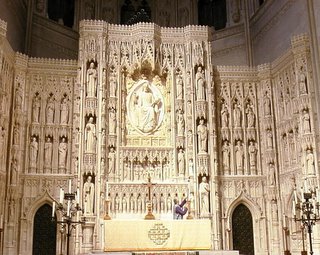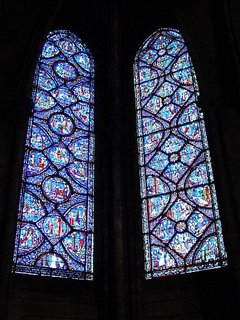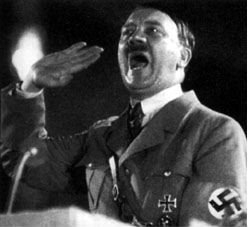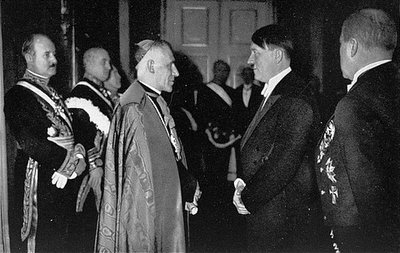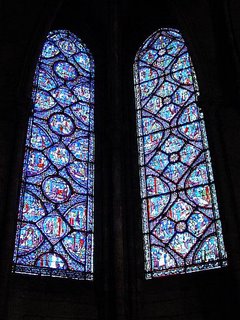 Lawrence Vance over at Lew Rockwell does not think so. Here is his review of Mansfields "The Faith of the American Soldier"
Lawrence Vance over at Lew Rockwell does not think so. Here is his review of Mansfields "The Faith of the American Soldier"DragonSlayerWanted
Can a Christian be a soldier? Stephen Mansfield thinks he can, and tells us so in his new book,
The Faith of theAmerican Soldier (Tarcher/Penguin, 2005). But are the two "callings" compatible? Does the combination not rather lead to a
cognitive dissonance from which there is no escape Mansfield is a former pastor whose "love of things military has moved him to earn a master’s degree in history and public policy and a doctorate in history and literature." This love of the military runs in his family, for we are also told in "About the Author" that "members of his family have been fighting for their country since the American Revolution." To write this book, dozens of "men and women who have heroically served in their country’s wars" were interviewed. Mansfield and "his research team" visited the battlefields of Iraq, "the plain" of West Point, the 101st Airborne at Fort Campbell, Kentucky, and the headquarters of USCENTCOM at MacDill Air Force Base in Tampa, Florida. The author has also written books about two war criminals: Britain’s
Winston Churchill (
Never Give In: The Extraordinary Character of Winston Churchill [Cumberland House Publishing, 2002]) and our own
George WMD Bush (
The Faith of George W. Bush [Tarcher/Penguin, 2003]). Mansfield introduces his book with the account of Lance Corporal James Gault cutting an Iraqi insurgent in half "almost exactly at the waist" with his .50 caliber machine gun. Gault watched in shock as "the man’s torso tilted forward, left his lower half, and fell to the street." But then we are presented with a paradox: "James Gault is a Christian and a warrior." Mansfield says of Gault: "He has killed, and he will kill again. In fact, he believes ‘the bad guys have to die.’ To kill in a righteous cause is what Gault has come to Iraq to do, and he does not shrink from the charge." But then we read that "Gault is also a Christian, a man who believes that Jesus is God, that He rose from the dead, and that the Bible is the truth of God for all men." Gault is a
Christian killer. The fact that he attended church before he deployed to Iraq and heard his pastor exhort the congregation to pray "for our young hero while he is overseas" doesn’t change anything. And neither is anything different because Gault’s pastor, his family, and the leaders of his church laid their hands on his shoulders and prayed that God would make his hands skillful to battle the Lord’s enemies. Gault is still a Christian killer. Ripping a man in half perplexes our man Gault: "He knows he is a follower of Jesus, and he knows that he is called to be a Marine, but the violence he unleashed leaves him needing assurance that he has killed in a righteous cause, that his country is doing the will of God in Iraq." Gault is tormented. He wants his chaplain to tell him that "our enemies are the enemies of God." He wants someone to explain to him "how this is a war between good and evil." Gault needs to know that he is "a servant of Jesus." He needs to be sure that he is "a soldier of Christ." Gault is not alone. There are thousands of Christians who have faced the same dilemma. Christians in the military who can bomb, maim, and kill for the state without thinking twice about it have a seriously defective form of Christianity. Christian soldiers who reason that it is not for them to judge whether a war is just or unjust are deceiving themselves. "Soldiers must know, in clear terms," says Mansfield, "not only why they fight but also if their cause is just." Unfortunately, however, Mansfield never addresses these questions. He aims to explore and celebrate "the religious nature of America’s military heritage" while cautioning us that "this is not to be confused, though, with a celebration of war. Only the immoral or the deformed of soul can exalt war itself, with all of the grinding horrors that it brings." But can "America’s military heritage" and "a celebration of war" be separated? Not when the true nature of this heritage is one of invasion, imperialism, oppression, interventionism, hegemony, belligerency, bellicosity, jingoism, death, and destruction – things never associated by Mansfield with "America’s military heritage." The book fails to deliver on another point as well. According to the dust jacket: "New York Times-bestselling author Stephen Mansfield surveys America’s wars from a religious and theological perspective in order to understand the theological framing and spiritual rationale for each, where they came from, and what effect they had on behavior on the battlefield." Since the book has no index, I have carefully gone through it searching for references to the American wars that the author is supposed to survey. The results are disappointing. Aside from the current war in Iraq and Afghanistan, there are references to fourteen conflicts (the only declared wars in U.S. history were the War of 1812, the Mexican War, the Spanish-American war, WWI, & WWII). Most of these references have nothing to do with surveying the war "from a religious and theological perspective." Mentioned one time each, but just in passing, is the Pequot War of 1637, the War of 1812, the Mexican War, the Spanish-American War, the war "to win the American West," and the conflict in Kosovo. The Korean War is mentioned twice. The first time is just a passing reference. The second occasion consists of one paragraph in which Mansfield says that the war had a religious dimension because "the Communist forces of North Korea took pride in publicly persecuting missionaries and desecrating churches" and "subjected captured American chaplains to horrendous torture." The Civil War also comes up twice. The first time is likewise just a passing reference. Four and a half pages are then devoted to accounts of chaplains during the conflict. The Gulf War is cited as the place where "the first hint on the battlefield that a new brand of warrior was seeking a vital faith in the field." It is also mentioned one more time in the context of anti-Semitism. There are three references to the American Revolutionary War if we count the mention of someone fighting "under George Washington." The second mention is of "minutemen in the American Revolution." There are three pages about pastors and chaplains during the American Revolution – hardly a survey of one of America’s wars "from a religious and theological perspective." The conflict in Mogadishu, Somalia, merits four references; however, none of them consist of more than a bare mention of the place.
The Vietnam War comes up on five occasions. It is mentioned in passing three times. Russell’s father "had been a ranger in Vietnam." Vietnam vets were spit on. POWs in Vietnam had courage. The only thing of substance is a discussion of chaplains in the Vietnam War that takes up two pages. Mansfield brings up World War I six times. Twice we are told that a certain man’s father had been a chaplain in World War I. Two other times we are told something else about chaplains. World War I is just causally mentioned the other two times. That’s it. World War II is mentioned seven times. The "ghost of a soldier" from World War II would be amazed at the technology used in modern warfare. A soldier’s uncles fought in World War II. Others fought in World War II. The essential role of the chaplain was recognized "by the advent of World War II." During the war, "The chaplains’ corps ballooned from a few hundred to nearly ten thousand." This leaves one reference of substance to World War II. Mansfield devotes six pages to the account of the American transport ship Dorchester and its four military chaplains. Mansfield’s book is a fraud. It no more "surveys America’s wars from a religious and theological perspective" than the Secretary of Defense pays attention to the number of dead Iraqis. So what is The Faith of the American Soldier about? What is the point the author is trying to get across? Mansfield says that the book is "the product of a search for the meaning of the American warrior code and the faith that gave it birth." Because he considers a nation’s "warrior code" to be "an extension of its soul, the embodiment of its highest ideals," the "guiding dream" of the book is "to understand that code and to honor it as the distilled greatness of a people."
This is gobbledygook. Each of the book’s five chapters contains vignettes of soldiers in Iraq, with a religious element, interspersed with some historical references and psychobabble. The message of the book can be reduced to this: Some American soldiers have been religious, many are religious right now, and others need to be more religious. The first chapter introduces us to the Millennials – the generation who came of age around the dawn of the new century. The Millennial is "better informed about his world than any generation that has been called upon to fight its nation’s wars." He is a "new brand of warrior." Millennials serving in the military in Iraq "take hold of religion as much as any army had in the nation’s history." Their "unique approach to religion" is "changing American at war." Their religion is characterized by an "unchurched faith" that rejects "the structures, doctrines, and standards of traditional faith in pursuit of spiritual experience, loving community, and stories that have power to define their lives." Mansfield explains that Millennials are eager for spirituality but suspicious of institutions, hungry for truth but bored by systematics, inspired by stories but repelled by standards, desperate for religious experience but put off by religious style, hoping for spiritual family but disgusted by empty conformity, longing for God but wondering if he is there. The spirituality of the Millennials is "perfectly suited for adaptation to the battlefield." It is utilitarian, pragmatic, eclectic, and experimental. The second chapter begins with the story of the Shield of Strength carried by many American soldiers – a "God and Country" trinket with a picture of the American flag and the words "One Nation Under God" on one side and the modified words of a Scripture verse on the other. Mansfield calls it "almost the classic Millennial military icon." He claims that it is "the emblem most often carried by members of the military in Afghanistan and Iraq." The amazing diversity of the faith of Christian soldiers is the next theme Mansfield picks up. But they have a "new brand of faith," one that is "more effective in meeting the needs of soldiers than traditional chapel services." This "new brand of faith" results in some strange "Christian" activities like a tank crew quoting aloud the Scripture they have memorized. I wonder what Scriptures they would quote while they were cutting a man in half like the Lance Corporal at the beginning of the book? Isn’t it wonderful that the Christian American soldier today can listen to a sermon from his home church on his iPod or watch his favorite preacher on a mini-DVD player? A "simplistic, one-answer-fits-all kind of spirituality" is out and a "working, experience-oriented, ‘real’ religion" is in. But still the soldiers seek out the chaplains: "What do I want? Sir, I wanna’ know that Jesus is in my Humvee." This assurance is provided by various rituals: praying, saying a blessing, reciting a confession, listening to worship music, making the sign of the cross over a Humvee, and, of course, carrying the Shield of Strength. But after all this, Mansfield ends on a sad note: The diverse faith of the Millennials "cannot be relied upon to guide the conduct of warriors in any meaningful way." The Millennials "informal faith" leads to a "variety of warrior codes" that result in "an unevenness if not an inconsistency to the conduct of warriors in the field."The third chapter is about those "men of cloth and steel" – military chaplains. Mansfield considers them "among the noblest figures in the field." He compares them to the priests of Israel leading the Jews into battle, but also to priests in Roman armies sacrificing animals and reading their entrails. Military chaplains are said to be the successors of the colonial fighting parsons – pastors who led militias into battle. The reader is led to believe that the chaplains of today are doing a great service to the country like those who served under George Washington in the Revolutionary War. Mansfield writes as if all the wars that America has been involved in are created equal: "Chaplains continued to earn respect during the wars to win the American West and the Spanish-American War." It doesn’t matter how unjust the cause, chaplains serve the Lord by ministering to the troops. Thus, Mansfield can laud "one bold chaplain" who constantly urged Marines "courage in their task by quoting scriptures and praying aloud" as he accompanied them on their mission – going door to door looking for insurgents in Fallujah. Chaplains who do have doubts about the justness of a particular war certainly aren’t free to express their opinion, as Mansfield’s account of a private questioning his chaplain shows: I went to a chaplain and asked if he thought God was on our side and if we were really fighting evil by fighting the insurgents. You could see he wasn’t sure, or at least that he didn’t want to say. He hesitated. Then he said: "Well, the president says we are fighting for democracy and the values of freedom. So we must be doing a good thing." I thought to myself, Man, that’s the answer I expected from my government professor back home, not from a spokesman for God.The fourth chapter returns to the idea of a "warrior code." Mansfield explains: The warrior code takes a soldier and makes him a knight. It connects the natural life of a fighter to a supernatural understanding of the warrior calling. His duties are transformed into holy sacrifices; his sense of self is reformed into an image of the servant in pursuit of valor. He becomes part of a fellowship, a noble tradition that flows through him and carries him beyond the mediocre and the vain. But is this something that Christians should involve themselves in? Mansfield maintains that "the foundation of any religiously influenced warrior code is a theology of war." He then brings up "the moral basis for war," and insists that Augustine’s "Just War Theory" provides "the basis for any warrior code."
Mansfield claims that "there was some consideration of the Just War theory" before the Bush administration invaded Iraq in March of 2003. He specifically refers to a February 10, 2003, lecture by Michael Novak on Christian Just War doctrine with specific reference to Iraq. The speech was a "brilliant exposition of the Augustinian theory of war as it has been applied through the ages, the contemporary applicability of those teachings, and the moral moorings of the Bush Doctrine." Moral moorings? Bush’s war is one of the most immoral interventions in U.S. history. It is against every Christian Just War principle that has ever been thought of. Any "warrior code" that can’t discern the unjust nature of this war is not a code that any Christian should follow. The fifth chapter opens with "the basic facts of the Abu Ghraib prison scandal as they are presented in the Schlesinger Panel’s report and as they have surfaced in interviews with guards at the scene." But Mansfield considers "a refusal to learn the lessons of Abu Ghraib and thus allow such scandals to reoccur" as "perhaps a greater misfortune." Men and women under "dire stress" may "descend into barbarism" if they don’t have moral leadership, core values held before them, and a noble sense of mission. They need a "faith-based warrior code." Mansfield never even considers that perhaps we just shouldn’t put men and women in situations like guarding the Abu Ghraib prison to begin with. But even worse, he is not averse to war at all. A "heartfelt warrior code" provides the restraint "to immoral behavior under the stress of war." How about the immoral nature of the Bush doctrine and war itself? There is nothing wrong with this war that Mansfield can’t fix with his "faith-based warrior code." We are introduced to a confused, young Christian soldier named Bob Daniels who wonders if true Christians are on the wrong side of this thing. Maybe the terrorists are doing god’s will. Maybe God wants to destroy the America that secular humanism built and restore her to be that city on a hill she is supposed to be. I came over here all fired up thinking we were fighting against evil. Now I’m wondering if we are evil. And what is Mansfield’s solution? Does he tell this young soldier that he has been deceived by the president and the U.S. government? Does he tell this young soldier about the history of U.S. wars and interventions that have helped create terrorists and enemies of the United States? No, "what Bob Daniels needs is what a faith-based warrior code would give him: an assessment of Islam that would frame his fight against terror." It is in the Epilogue that we see in full bloom the real hypocrisy of the American Christian soldier. Mansfield describes how a band of Marines, fully dressed for battle, hold their rifles aloft "as though to say, ‘Here, O Lord, receive this weapon into Your service.’" Then they recite the doxology, quote a verse of scripture together, pause in silence for each man to confess his sins, quote another verse of scripture, sing a hymn, have a responsive reading (during which time some soldiers kiss their Shield of Strength trinket), say "Amen" – and then go out and fight and kill for the U.S. government. In the end, Mansfield is no different than the state-worshipping, Bush-idolizing, Republican Party-adoring, pious Christian warmongers who do all but call for my death as a traitor because I dare to criticize
their leader and
his war."The only defensible war is a war of defense," said
G.K. Chesterton. Perhaps Mansfield ought to
read him before he writes another book justifying Christian participation in U.S. wars.
Laurence M. Vance [
send him mail] is a freelance writer and an adjunct instructor in accounting and economics at Pensacola Junior College in Pensacola, FL. He is also the director of the
Francis Wayland Institute. His new book is
Christianity and War and Other Essays Against the Warfare State. Visit
his website.
 Interesting thoughts from The Dark Age Blog. It highlights traditional Christendom's inability to forgo violence in a last gasp at the beginning of the modern 20th century. Within Christendom today it is the adherents of fundamentalist Rapture theory who support unleashing the dogs of war in a tragic attempt to maintain power and influence. Note that he correctly points out that Fukyama was wrong its not the "End of History" but the end of Christendom.
Interesting thoughts from The Dark Age Blog. It highlights traditional Christendom's inability to forgo violence in a last gasp at the beginning of the modern 20th century. Within Christendom today it is the adherents of fundamentalist Rapture theory who support unleashing the dogs of war in a tragic attempt to maintain power and influence. Note that he correctly points out that Fukyama was wrong its not the "End of History" but the end of Christendom.

